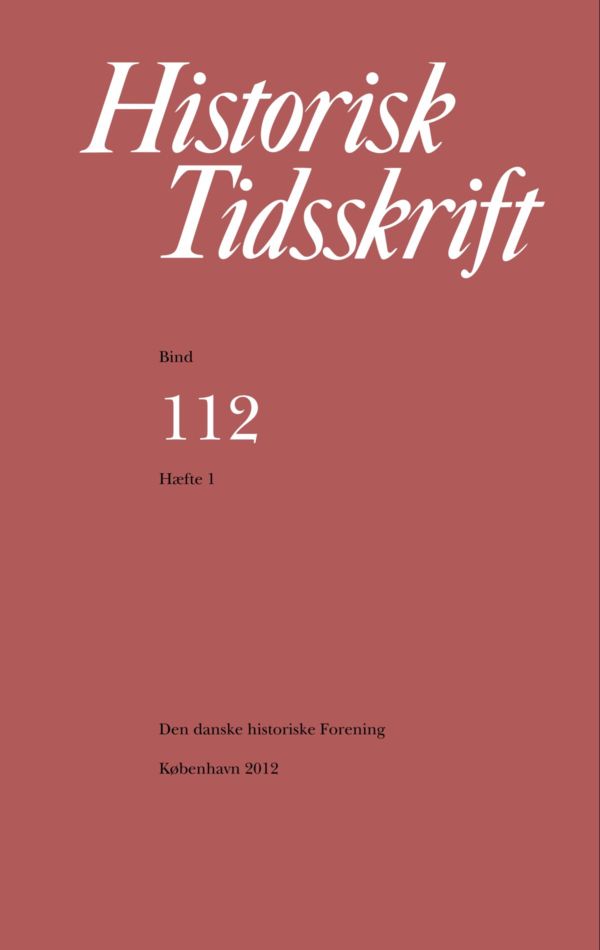De ønskede og de uønskede. Indfødsretten og opgøret efter besættelsen
DOI:
https://doi.org/10.7146/ht.v112i1.56552Resumé
»Desirables« and »Undesirables« Naturalization Policy as Part of the Reckoning after the German Occupation of Denmark, 1940-45Citizenship became part of the reckoning that followed Liberation Day, May 5, 1945. According to the existing act in force, foreigners could, under certain conditions, obtain Danish citizenship without interference from the authorities, automatically so to say. Foreigners’ children born and resident in Denmark obtained that privilege at the age of 19. The same did foreign women who married a Dane. With the occupation of Denmark in 1940, the government found these provisions inconvenient as far as German citizens were concerned. After the war, Danish women who had married German citizens, especially German soldiers, were found unworthy of keeping their inborn Danish citizenship. Therefore, the Danish Parliament passed a provisional law (Act no. 379 of July 12, 1946) amending the law of citizenship. Accordingly, all citizenships acquired automatically by German subjects since April 9, 1940 were cancelled; and Danish women who had married a German citizen after April 8, 1940 were deprived of theirs. However, persons thus affected by the law could, on their own initiative, have their case individually tested by the Parliament, represented by a standing committee of members. The only relevant criterion was the national attitude displayed during the occupation. Persons who had shown unpatriotic conduct were deemed undesirable. Those who succeeded to recover or obtain Danish citizenship through this procedure were individually included in a special act, different from the ordinary acts granting citizenship to foreigners who were not involved in the post-occupation reckoning. Young Germans who had been members of NS youth organizations such as the Hitlerjugend or attended local German schools, did not obtain or recover Danish citizenship, and neither did those who had enlisted in the German army. Pro-NS-minded German women married to a Dane were also rejected. For Danish women who had married a German soldier, the case was less clearcut, but conditions for retaining citizenship were not clearly stated, and today the provision can hardly be explained in any other way than as an act of revenge. Apparently, those who were alone with their children and had only had intimate relations with the same male person, were in a more favorable position than others. For those Norwegian women who had taken the step into matrimony together with a German, conditions were even harsher as they, deprived of their citizenship, did not get the opportunity to have their case evaluated on an individual basis. Many of them were deported to Germany together with their children. In total, 2715 persons obtained Danish citizenship according to Act no. 379 of July 12, 1946, while only about 300 were refused. About 80 % of the included persons were German women married to Danish men; most of these had been employed in civil jobs in Germany during the war. The fact that only a minor part of the applicants was refused was in accordance with what the Minister of Interior had predicted when the bill was read. The act expired on December 31, 1948. After the end of the war, a number of German citizens who had resided in Denmark for many years, even before 1940, wanted to become naturalized here. One common motive was the safe haven in turbulent times offered by an inalienable right to live on Danish territory. However, in order not to give offence to the many Danes who nourished anti-German sentiments after years of oppression, their applications were refused for no other reason than their current German citizenship. However, after a couple of years some highly respected community members of German origin were naturalized and from 1951 special restrictions were no longer applied. Beginning in 1933, hundreds of persecuted Jews, politicians and anti-NSactivists emigrated from Germany to Denmark. After the war, many of them applied for Danish citizenship. Quite a few Danes took a special interest in the Jewish refugees. According to Nazi laws they had been deprived of their right to citizenship and were in fact stateless. However, with few exceptions, their applications were refused with reference to their lack of acquaintance with Danish society and culture; neither could they meet the standard requirement of at least 15 years of residence in Denmark. Although they were victims of the NS regime, the Parliament hesitated to make special arrangements for this or any other specific group selected on the basis of religious or ethnic criteria. Still, Jewish emigrants kept their residence permit.Downloads
Publiceret
Citation/Eksport
Nummer
Sektion
Licens
Ophavsret til bidrag i Historisk Tidsskrift tilhører forfatterne og Den danske historiske Forening som udgiver af Historisk Tidsskrift. For illustrationer gælder den ophavsret, som står anført i billedteksten. Ophavsretslovens almindelige bestemmelser gælder, hvilket vil sige, at ophavsretten gælder i 70 år efter forfatterens død. Bidrag i Historisk Tidsskrift må derfor, med forbehold for en ”moving wall” på tre år, frit downloades, læses, gemmes, anvendes og citeres (med kildeangivelse) i privat og videnskabelig sammenhæng, men de må ikke helt eller delvis genudgives af tredjepart, heller ikke i redigeret form, uden tilladelse fra forfatterne og Den danske historiske Forening. Henvendelse skal i så fald rettes til Historisk Tidsskrifts redaktion på histtid@hum.ku.dk.





